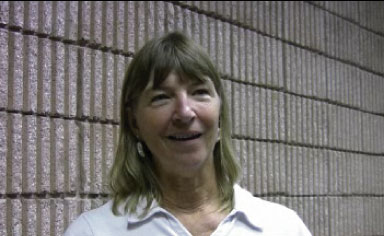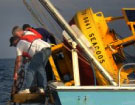COSEE SouthEast has provided Dr. Thomas with the tools to translate science into useful information through
proven education and outreach programs in which scientists as well as educators can engage in strategic partnerships. "The vast majority of my
outreach work has been through COSEE," she says. "I became involved early on as a research specialist, helping build an inventory of scientists
in the region."
In her role as research specialist Carrie first helped COSEE SouthEast determine the number and range of ocean scientists in the region,
discovering that only a relatively small number of them were engaged in meaningful, well-funded outreach programs. Carrie was then able
to provide ways for those scientists who were not previously involved in education and outreach to get engaged, thus broadening participation.
In 2009, Carrie developed a study to establish preliminary benchmarks on the diversity of the regional ocean science workforce, and co-authored
a report on the results, "Survey on Diversity in Ocean Sciences Workforce in Federal and State Agencies and in Institutions of Higher Education
in North Carolina, South Carolina and Georgia". The purpose was to gather baseline data regarding the racial/ethnic diversity of scientific
professionals, faculty and graduate students associated with ocean sciences programs.
Read the results and see the survey.
As both a researcher and an educator, Carrie is also able to help researchers develop broader impacts statements. "We need someone like
Carrie to make sure that our language is in the same dialect," says COSEE SouthEast lead investigator Dr. Lundie Spence. "She provides advice to
scientists on how they can write broader impacts proposal sections that have strategies to impact other audiences. Carrie has been instrumental in
making sure that what we present to the research community is valid."
Coastal Legacy is a
Science, Technology and Society (STS) professional development program. The 2009 workshop focused on the impacts of
human development on coastal and estuarine habitats. Current efforts are underway to develop ongoing communication between
Coastal Legacy educators and scientists using their common experiences in estuaries and water quality. "It was an eye-opener
to the researchers about how carefully they need to present themselves," says Lundie. "Carrie represents the truth, the one
who says, 'Wait a second, this isn't the way to present this topic.' She's been able to speak for the research community."
The
Ocean Sciences Education Leadership Institute is a Science, Technology,
Engineering and Math (STEM) professional development program. In 2008, the theme was Undersea Research and Technology: Revealing the Deep.
Read about the Institute and Carrie's presentation.
The 2009 institute, Seas of Change: Evidence of Southeastern Climate Change, featured researchers who offered information on sea level rise, sea
surface temperature and ocean acidification, and associated impacts. The 2010 summer institute will host 30 formal and informal regional educators
and 15 researchers in North Carolina. "Carrie's role in our program has been pivotal," says Lundie. "We don't have a large staff so one person has
the ability to make a huge difference and she stands her ground. Her skills have improved our whole program."



